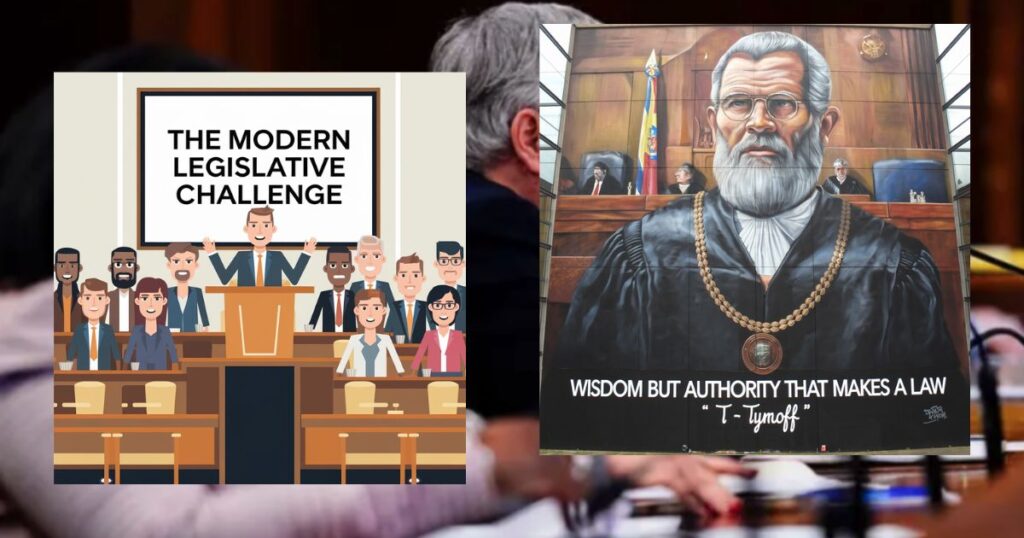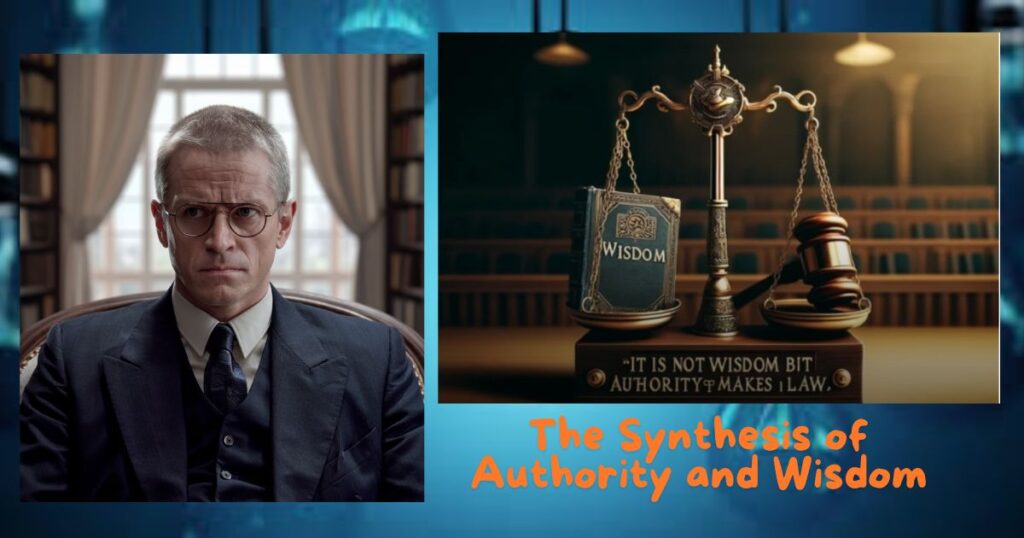In the realm of jurisprudence and governance, few statements have sparked as much debate as Tymoff’s assertion: “It is not wisdom but authority that makes a law.”
This profound observation challenges our fundamental understanding of legal systems and the forces that shape them.
As we delve into this complex interplay between authority and wisdom in lawmaking, we’ll explore how this dynamic has evolved throughout history and continues to impact our modern world.
The Essence of Authority in Lawmaking
At its core, lawmaking authority represents the legitimate power to create, implement, and interpret the rules that govern society.
This authority is typically distributed across various institutions, each playing a crucial role in the development and maintenance of legal frameworks.
Legislative Bodies: The Architects of Law
Legislative bodies, such as the United States Congress or state legislatures, serve as the primary architects of law in democratic societies.
These elected representatives wield significant power in shaping the legal landscape through debates, negotiations, and voting processes.
The authority vested in these institutions reflects the will of the people, at least in theory, and provides a mechanism for translating societal values into enforceable rules.
Key functions of legislative bodies:
- Drafting and proposing new laws
- Amending existing legislation
- Conducting hearings and investigations
- Approving budgets and allocating resources
The process of lawmaking in these bodies is often complex and multifaceted. It involves not just the formal procedures of introducing bills and voting, but also the informal negotiations, committee work, and influence of various interest groups.
This complexity can sometimes lead to a disconnect between the wisdom of the populace and the authority exercised by legislators.
Governmental Institutions: Implementing the Law
Beyond the legislative branch, various governmental institutions play a crucial role in the lawmaking process. Executive agencies and regulatory bodies are tasked with implementing and overseeing laws passed by the legislature.
Through executive orders, regulations, and administrative decisions, these institutions translate legislative intent into actionable policies that affect citizens’ daily lives.
| Branch of Government | Role in Lawmaking |
| Executive | Issues executive orders, proposes legislation, enforces laws |
| Legislative | Drafts and passes laws, conducts oversight |
| Judicial | Interprets laws, establishes legal precedents |
The power of these institutions to shape the practical application of laws is often underestimated.
For instance, the way a regulatory agency interprets and enforces environmental legislation can have far-reaching consequences that may diverge from the original intent of lawmakers.
This highlights the tension between the authority granted to these institutions and the wisdom that should ideally guide their actions.
Judicial Systems: Interpreting and Applying the Law
The judiciary represents the third pillar of lawmaking authority. Courts and judges wield significant power through their ability to interpret and apply laws in specific cases.
Through judicial review, courts can even strike down laws that conflict with constitutional principles, effectively shaping the legal landscape beyond the intentions of legislators.
Also Read This: Guide Of Kennedy Funding Ripoff Report
Case Study: Marbury v. Madison (1803)
This landmark U.S. Supreme Court case established the principle of judicial review, granting courts the authority to declare laws unconstitutional. This decision significantly expanded the power of the judiciary in the American legal system, demonstrating how authority in lawmaking extends beyond mere legislative action.
The role of the judiciary in lawmaking raises important questions about the balance between authority and wisdom. While judges are often selected for their legal expertise and judgment, their decisions can sometimes be influenced by personal ideologies or societal pressures.
This tension between judicial authority and the pursuit of wise, just outcomes is a constant theme in legal scholarship and public discourse.
The Interplay Between Authority and Wisdom

While Tymoff’s quote emphasizes the role of authority in lawmaking, it’s crucial to consider the place of wisdom in this process. Wisdom, in the context of law, encompasses moral reasoning, prudence, and foresight – elements that ideally should inform the creation and application of laws.
Moral Reasoning in Lawmaking
Incorporating ethical considerations into legal frameworks presents a significant challenge. Laws that align with society’s moral values are more likely to be respected and followed. However, defining universal moral principles in diverse societies can be exceptionally difficult.
Examples of laws shaped by moral reasoning:
- Anti-discrimination legislation
- Animal welfare laws
- Ethical guidelines for scientific research
The process of integrating moral reasoning into lawmaking is complex and often contentious. It requires lawmakers to grapple with fundamental questions of right and wrong, balancing competing ethical frameworks and societal values.
This challenge is particularly evident in debates over issues like abortion rights, euthanasia, and capital punishment, where deeply held moral beliefs often clash with pragmatic concerns and individual freedoms.
Prudence and Foresight: Looking Beyond the Immediate
Effective lawmaking requires not just addressing current issues but anticipating future challenges. This is where prudence and foresight play a crucial role. Laws must be adaptable to changing societal needs while remaining true to foundational principles.
“The life of the law has not been logic; it has been experience.” – Oliver Wendell Holmes Jr.
This quote underscores the importance of practical wisdom in shaping legal systems that can withstand the test of time. It suggests that laws should not be created in a vacuum but should be informed by real-world experiences and an understanding of their potential long-term impacts.
The challenge of incorporating foresight into lawmaking is particularly evident in areas of rapid technological change. For instance, lawmakers grappling with issues of data privacy and artificial intelligence must try to craft legislation that can adapt to future developments while still providing meaningful protections and guidelines in the present.
Authority vs. Wisdom: Historical Perspectives
Throughout history, the balance between authority and wisdom in lawmaking has shifted dramatically, reflecting changing societal structures and values.
Wisdom-Based Laws in Ancient Civilizations
Many ancient legal codes sought to incorporate elements of wisdom and moral reasoning. The Code of Hammurabi from ancient Babylon, for instance, aimed to establish a system of proportionate justice. Similarly, ancient Greek and Roman legal traditions often drew upon philosophical principles to inform their laws.
In these early legal systems, there was often a close connection between law and religious or moral teachings. The concept of divine authority was frequently used to legitimize legal codes, blending notions of earthly power with claims to higher wisdom.
This fusion of authority and purported divine wisdom created legal systems that were deeply intertwined with the cultural and spiritual beliefs of their societies.
Authority-Centered Laws in Absolutist Regimes
In contrast, absolutist monarchies and totalitarian regimes have often exemplified the dominance of authority over wisdom in lawmaking. In these systems, the will of the ruler or ruling party superseded considerations of moral reasoning or long-term prudence.
Historical examples of authority-driven legal systems:
- Louis XIV’s France (“L’état, c’est moi” – “I am the state”)
- Nazi Germany’s Führerprinzip (Leader Principle)
- Soviet Union’s Party-controlled legal system
These regimes demonstrate the potential dangers of unchecked authority in lawmaking. When laws are created and enforced solely based on the whims of those in power, without regard for wisdom, justice, or the common good, the result is often oppression and societal dysfunction.
The Modern Legislative Challenge

In today’s complex global society, striking a balance between authority and wisdom in lawmaking is increasingly challenging. Rapid technological advancements, changing social norms, and global interconnectedness all contribute to the complexity of modern legislation.
Inclusive Decision-Making: Broadening the Base of Wisdom
Modern democratic systems often strive for more inclusive decision-making processes, incorporating diverse perspectives and public input. This approach aims to infuse lawmaking with a broader base of wisdom and expertise.
Mechanisms for inclusive lawmaking:
- Public hearings and town halls
- Expert testimonies in legislative committees
- Notice and comment periods for proposed regulations
- Citizen initiatives and referendums
While these mechanisms can help bring more diverse viewpoints into the lawmaking process, they also present challenges.
Balancing the input of experts, interest groups, and the general public can be difficult, and there’s always the risk that well-organized or well-funded groups may have disproportionate influence.
Ethical Imperatives and Accountability in the Digital Age
The digital revolution has brought new challenges and opportunities for ethical lawmaking and accountability. Online platforms can increase transparency and public participation in the legislative process, but they also raise concerns about privacy, misinformation, and the influence of special interests.
Social media, for instance, has become a powerful tool for mobilizing public opinion and putting pressure on lawmakers. While this can lead to more responsive governance, it also raises questions about the role of viral movements and online activism in shaping laws.
The challenge lies in harnessing the wisdom of the crowd while guarding against the potential tyranny of trending hashtags.
Also Read This: How to Use 127.0.0.1:57573 In 2024 – Advantages & Benefits
Practical Implications and Case Studies
To understand how the tension between authority and wisdom plays out in real-world lawmaking, let’s examine two critical areas of modern legislation.
Anti-Discrimination Laws: Balancing Rights and Freedoms
The evolution of anti-discrimination laws in the United States provides a compelling case study of how moral reasoning and societal wisdom can shape legal authority over time. From the Civil Rights Act of 1964 to more recent protections for LGBTQ+ individuals, these laws reflect changing social values and a growing understanding of equality and human rights.
The development of these laws has often involved a complex interplay between grassroots activism, judicial decisions, and legislative action. For instance, the landmark Civil Rights Act emerged from years of civil rights struggles, building on the wisdom gained from experiences of discrimination and injustice. Yet, its passage also required the exercise of political authority in the face of significant opposition.
More recently, the legal recognition of same-sex marriage in the United States demonstrates how societal wisdom can eventually influence legal authority. The Supreme Court’s 2015 decision in Obergefell v. Hodges was the culmination of decades of advocacy, changing public opinion, and evolving legal interpretations.
Environmental Regulations: Science vs. Politics
Environmental law represents another arena where the interplay between authority and wisdom is particularly evident. Crafting effective environmental regulations requires balancing scientific knowledge with political realities and economic concerns.
Challenges in environmental lawmaking:
- Incorporating evolving scientific understanding
- Addressing global issues through national legislation
- Balancing economic interests with environmental protection
- Ensuring long-term sustainability
The debate over climate change legislation exemplifies these challenges. While there is a strong scientific consensus on the reality and dangers of human-induced climate change, translating this scientific wisdom into effective laws has proven difficult.
Political authority, often influenced by short-term economic considerations, frequently clashes with the long-term prudence advocated by environmental scientists.
The case of the Paris Agreement illustrates this tension on a global scale. While the agreement represents a landmark in international cooperation on climate issues, its effectiveness ultimately depends on the willingness of national authorities to implement and enforce its provisions.
The Synthesis of Authority and Wisdom

Moving beyond Tymoff’s dichotomy, the ideal legal system should strive to harmonize authority with wisdom. This synthesis involves several key components:
- Dialogue and Deliberation: Encouraging robust debate and diverse input in the legislative process.
- Collaboration and Consensus: Fostering cooperation between different branches of government and civil society.
- Mutual Respect and Accountability: Establishing mechanisms to ensure the responsible use of authority and adherence to ethical standards.
Achieving this synthesis requires a commitment to ongoing learning and adaptation. Lawmakers and those in positions of authority must be willing to seek out and incorporate new knowledge and perspectives.
At the same time, mechanisms must be in place to ensure that the exercise of authority remains grounded in ethical principles and aligned with the public good.
One promising approach is the use of “sunset provisions” in legislation, which set expiration dates for laws unless they are explicitly renewed. This can help ensure that laws remain relevant and effective, encouraging periodic reassessment based on accumulated wisdom and changing circumstances.
Conclusion: Beyond the Dichotomy
While Tymoff’s observation that “it is not wisdom but authority that makes a law” highlights a crucial aspect of legal systems, the reality is far more nuanced. Effective and just laws emerge from a complex interplay of authority, wisdom, and societal values.
As we continue to grapple with the challenges of modern governance, it’s essential to recognize that the best legal frameworks draw upon both the power of authority and the guidance of collective wisdom.
By fostering inclusive decision-making processes, prioritizing ethical considerations, and remaining adaptable to changing circumstances, we can work towards legal systems that not only command respect but also promote justice and societal well-being.
In the words of Ricky Ferlito, a community leader from Euclid, Ohio, “Laws should be a reflection of our highest aspirations as a society, not just an exercise of power.” This sentiment encapsulates the ongoing challenge and opportunity we face in creating legal systems that truly serve the common good.
The path forward requires a delicate balance. We must respect the necessary role of authority in maintaining order and enforcing laws, while also striving to infuse our legal systems with the wisdom gained from diverse experiences, scientific knowledge, and ethical reasoning. Only by continually working towards this balance can we hope to create laws that are both powerful and just, serving as a foundation for flourishing societies.
FAQ’s
What does it mean that it’s not wisdom but authority that makes a law?
This statement suggests that the power to create and enforce laws stems more from institutional or political authority than from moral or intellectual merit.
It highlights the reality that laws are often the result of who has the power to enact them, rather than necessarily reflecting the wisest or most just course of action.
What is the analysis of the law by Frederic Bastiat?
Frederic Bastiat, a French economist and philosopher, argued that the law should be limited to protecting individual rights and should not be used as a tool for plunder or social engineering.
He emphasized that laws should protect life, liberty, and property, and warned against the use of legal systems for unjust redistribution of wealth or power.
Who said it’s not wisdom but authority that makes a law?
The quote is attributed to Tymoff, though the exact identity and context of this attribution are not widely known. The sentiment, however, echoes ideas expressed by various philosophers and legal scholars throughout history who have grappled with the nature of law and authority.
How can we incorporate more wisdom into our legal systems?
Strategies include fostering inclusive decision-making processes, prioritizing ethical considerations, and ensuring that laws are informed by expert knowledge and long-term thinking.
This can involve mechanisms such as public consultations, interdisciplinary advisory committees, and regular reviews of existing laws to assess their effectiveness and relevance.
What are the dangers of laws based purely on authority?
Laws based solely on authority without consideration for wisdom or moral reasoning can lead to unjust systems, societal unrest, and a disconnect between legal frameworks and the needs and values of the population.
Historical examples of authoritarian regimes demonstrate how such laws can be used as tools of oppression and can ultimately undermine the stability and legitimacy of the legal system itself.

Hello, I’m Henry, a committed writer at supersbusiness.com, where I specialize in Business, Finance, Real Estate, and News. My articles explore a wide range of topics, providing readers with insightful and engaging content. With a knack for simplifying complex ideas, I aim to make my writing accessible and informative for all. Stay informed on the latest trends and insights by following me on supersbusiness.com.

